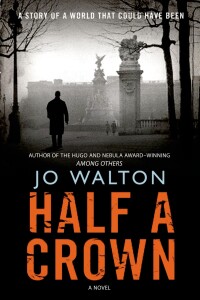 In the conclusion to her Small Change trilogy, which began with Farthing and continued with Ha’Penny, Jo Walton returns to a postwar Britain that has negotiated peace with Hitler in exchange for a supposed autonomy. In reality, fascism has infiltrated British life to such an extent that a young girl can consider it “terrific fun.”
In the conclusion to her Small Change trilogy, which began with Farthing and continued with Ha’Penny, Jo Walton returns to a postwar Britain that has negotiated peace with Hitler in exchange for a supposed autonomy. In reality, fascism has infiltrated British life to such an extent that a young girl can consider it “terrific fun.”
The girl is Elvira Royston, whom readers of Ha’Penny will recognize as the daughter of one of the major characters in that book. Ten years later, she is on the verge of adulthood, preparing for her presentation to the Queen and for entry into Oxford. Questioning the political status quo is not on her agenda. But when she goes for a “fun” evening out to a rally that turns ugly, she quickly gets a crash course in the not-so-fun side of fascism.
Elvira narrates half of the book in the first person (as with the other two books, which had different female narrators). The other half, in third-person chapters alternating with Elvira’s, is again from the point of view of P.A. Carmichael, now head of the Watch — the British Gestapo — as well as an organization that secretly aids the Watch’s victims. He is also Elvira’s guardian, and has indeed striven to guard her from all knowledge and ill effects of the deeply corrupt system that employs him, as well as of his own illicit activities. When she is caught up in the web of torture, lies, and injustice that he himself has been implicit in creating, his double life can no longer be sustained; something has to change — and not in a small way.
I suppose that Half a Crown could be read on its own, but if such a scenario intrigues you, I strongly recommend reading the other two books in order first. Carmichael’s character is the backbone of the series, and Walton develops it with great skill over the three volumes. You must read them all to understand his choices in this one.
One’s affinity to the other voice in each book is largely a personal matter; I myself was not very drawn to Elvira, whose preoccupation with typical teenage concerns forms an ironic counterpoint to the very adult drama going on around her, but is not in itself especially interesting. Once the plot gets rolling, though, that doesn’t matter a great deal. You turn the pages to find out what happens to Elvira, like her or not. You don’t want to miss that presentation to the Queen; it’s literally the most important event in her short life.
Jo Walton discusses aspects of life, work, and literature in a blog on her website.
(Tor, 2008)
